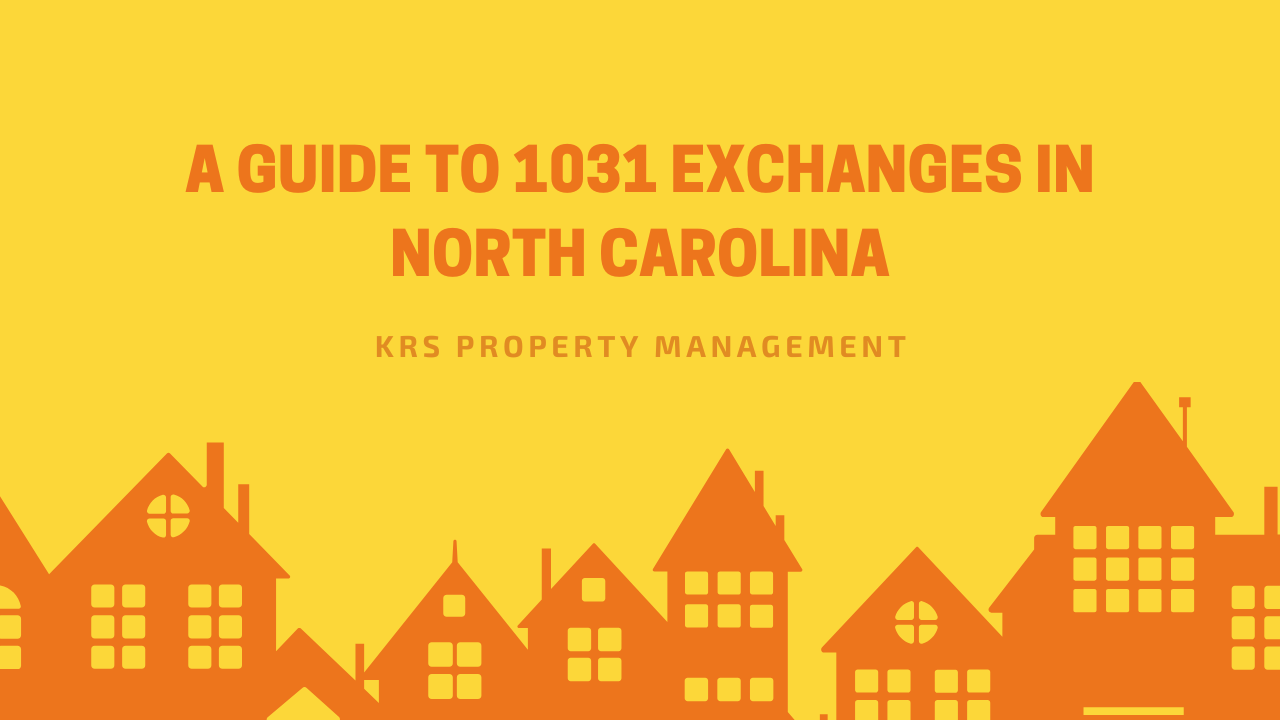Key Takeaways
Investment Properties Only: Only real estate held for business or rental qualifies — no personal residences or vacation homes.
Document Everything: Accurate and timely paperwork is essential to maintain compliance and receive the tax tips and benefit.
Use a Qualified Intermediary (QI): Proceeds must go through a QI; touching the funds yourself disqualifies the exchange.
A Guide to 1031 Exchanges in Raleigh, North Carolina: Seven Key Tips
For many landlords, capital gains taxes can feel like a major roadblock when reinvesting in new opportunities. That’s where understanding the benefits of a 1031 exchange can make all the difference. In this guide, we’ll break down what a 1031 exchange is, how it works, and what you should keep in mind throughout the process.
KRS Property Management serves landlords across Raleigh, North Carolina. This resource is tailored by us to help you make informed, confident investment decisions.
What Is a 1031 Exchange and Why Should Landlords Care?
A 1031 exchange is a tax-deferral strategy that allows landlords to sell one investment property and reinvest the proceeds into another like-kind property, without immediately paying capital gains taxes. For landlords, this means more money stays in your investment cycle rather than going to the IRS.
The term "like-kind" refers to real estate held for business or investment purposes, so it doesn’t have to be the same type of property. Whether you're selling a single-family rental and purchasing a multi-unit building or switching to a commercial space, the 1031 exchange can work in your favor. It’s a smart move if you’re thinking long-term and want to grow your portfolio without tax setbacks.
How Does a 1031 Exchange Work for North Carolina Landlords?
The process begins when you sell your current investment property and identify a replacement property within 45 days. From there, you have 180 days to close on the new purchase. All the proceeds from the sale must be handled by a qualified intermediary, not by you directly, to ensure the exchange is valid under IRS rules.

Timing, documentation, and property qualifications are critical, which is why it’s important to understand the requirements before jumping in. For landlords across North Carolina, especially in markets like Raleigh, a 1031 exchange offers a powerful way to upgrade or diversify your portfolio while keeping your tax burden in check.
What to Keep in Mind During a 1031 Exchange
As a landlord in North Carolina, understanding the ins and outs of a 1031 exchange is crucial. Here are the key things you need to be mindful of.
1. Only Investment Properties Qualify
For North Carolina landlords, it’s important to know that a 1031 exchange only applies to real estate held for investment or business purposes. This means the property you're selling and the one you're buying must both be used to generate rental income or for business activities. You can't exchange a personal residence or vacation home.
If you're considering selling a rental unit in Raleigh to buy another income-generating property elsewhere in the state, you’re likely on the right track. Just be sure both properties meet the IRS definition of investment real estate.
2. Strict Timelines Matter
Timing is everything in a 1031 exchange, and the IRS doesn’t offer extensions. Once your current property closes, you have exactly 45 calendar days to identify potential replacement properties in writing. From that date, you have 180 days to finalize the purchase of one or more of those identified properties.
Landlords in North Carolina need to be especially mindful of these deadlines when planning. Delays or last-minute decisions can lead to losing the tax-deferred benefit altogether, which is why it's essential to stay organized and act quickly.
3. You Can’t Touch The Proceeds
After selling your investment property, the proceeds from that sale cannot go directly into your bank account. Instead, those funds must be handled by a qualified intermediary, often referred to as a QI. This neutral third party holds the money until it's used to purchase your replacement property.

If you access the funds personally, even by mistake, the IRS will treat it as a taxable sale. For landlords in North Carolina, working with a reputable QI from the start helps ensure the process stays compliant and on track.
4. Replacement Property Value Should Be Equal Or Greater
To get the full tax deferral benefit, your new property must be equal to or greater in value than the one you’re selling. This also includes reinvesting all of the net proceeds from your sale.
For example, if you’re selling a rental property in Raleigh worth $400,000, your replacement property must be at least that value, and all sale proceeds should go into the new purchase. Falling short on either part may result in a portion being taxable, so it's worth planning carefully to meet the IRS's criteria.
5. Financing Must Be Carefully Structured
If your sold property had a mortgage, your replacement property should carry equal or greater debt to avoid what’s known as “boot,” which can trigger taxes. Let’s say you're a landlord in Raleigh selling a duplex with a $200,000 mortgage.
If your new investment has a smaller loan or no loan at all, the IRS might see that difference as taxable gain. North Carolina landlords should work closely with their lender to structure financing that mirrors or exceeds the previous debt, ensuring a smoother exchange and full deferral of taxes.
6. Not All Property Types Are Compatible
While most investment properties are considered like-kind, there are limitations. The IRS defines like-kind broadly, but not all property types automatically qualify. For instance, raw land can be exchanged for a rental home, but a primary residence or fix-and-flip project doesn’t count.

North Carolina landlords should double-check that both the property they’re selling and the one they’re buying meet IRS guidelines. If you’re uncertain, it’s better to ask upfront rather than risk your exchange being disqualified after the fact due to incompatible property types.
7. Proper Documentation Is Essential
Every step in the 1031 exchange process must be backed by clear, timely documentation. This includes the sales agreement, exchange agreement, identification notice, and closing statements. Even small errors can lead to delays or denial of the tax benefit.
For landlords across North Carolina, maintaining organized records isn’t just about meeting IRS rules, it’s about protecting your investment strategy. Consider keeping both physical and digital copies of all documents and ensure that each form is submitted within the required timeline to keep your exchange fully compliant.
Make the Most of Your Next Move
Navigating a 1031 exchange can be rewarding when done right, and that’s where KRS Property Management in Raleigh steps in. With local insight and a landlord-first approach, we can help you explore smart options for reinvestment. Reach out today to see what strategy fits your long-term goals best.







